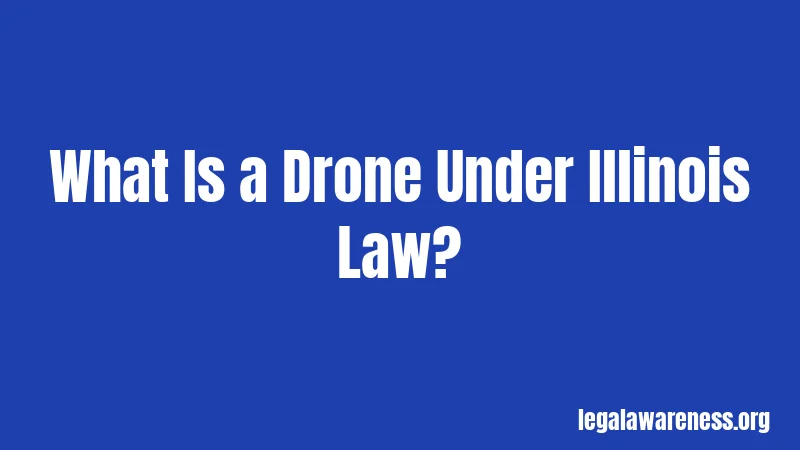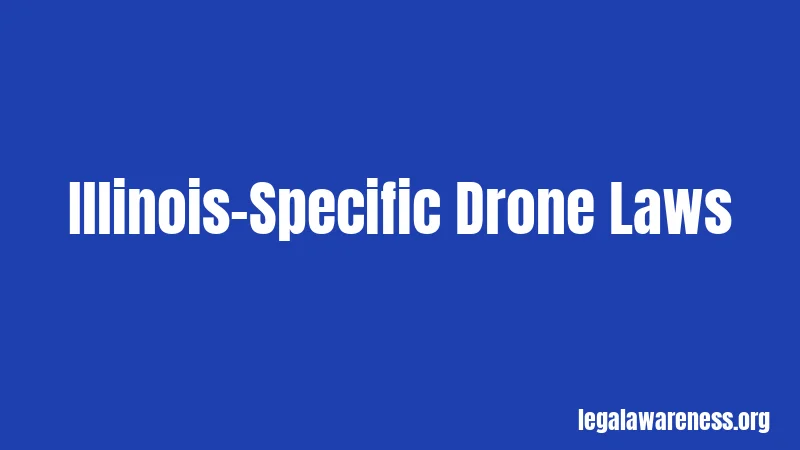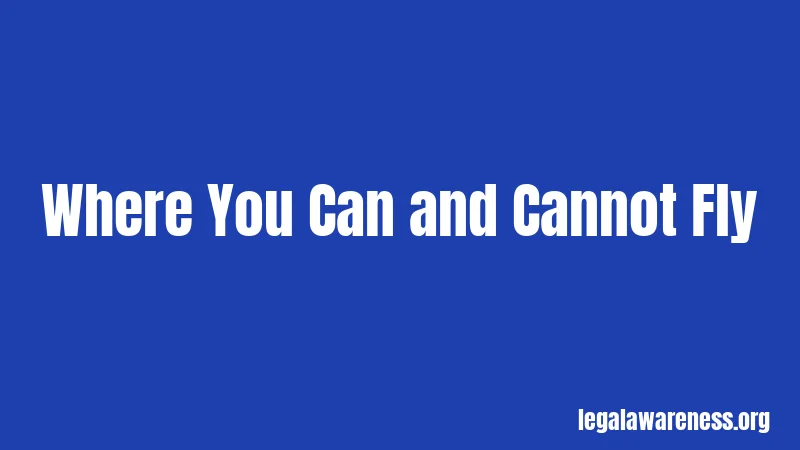Drone Laws in Illinois (2026): Your Complete Flying Guide
Most people think they can just buy a drone and start flying. Wrong. Illinois has strict rules that could cost you thousands if you break them. Let’s break down exactly what you need to know to fly legally and stay out of trouble.
Whether you’re flying for fun or running a business, these laws apply to you. And trust me, the penalties are no joke.
What Is a Drone Under Illinois Law?

A drone is any aircraft that flies without a human pilot onboard. Pretty simple, right?
In Illinois, drones are officially called unmanned aircraft systems or UAS. The law covers everything from tiny toy drones to large commercial models. If it flies without a person in it, it’s a drone.
The state follows federal rules set by the FAA. But Illinois also has its own specific laws. You need to follow both sets of rules to stay legal.
Basic Federal Requirements for All Illinois Drone Pilots
Here’s the deal. The FAA controls American airspace, including Illinois.
Every drone pilot must follow federal rules first. These apply whether you’re in Chicago or a small farm town. No exceptions.
Registration Requirements
You must register your drone if it weighs more than 0.55 pounds. That’s about 250 grams. Most drones with cameras hit this weight easily.
Registration costs $5. It covers all your recreational drones for three years. Commercial operators pay $5 per drone.
You register online at the FAA DroneZone website. Takes about five minutes. You’ll get a registration number that you must display on your drone.
Hold on, this part is important. You need to carry proof of registration when you fly. Either print it or keep a digital copy on your phone.
The TRUST Test for Recreational Flyers
Flying for fun? You need to pass the TRUST test.
The Recreational UAS Safety Test teaches basic drone safety. It’s free and takes about 30 minutes online. You only take it once.
The test covers simple stuff. Flight rules, safety guidelines, and common sense operations. Honestly, it’s not difficult.
You must carry proof of passing TRUST when you fly. Law enforcement can ask to see it. No proof means possible fines.
Part 107 for Commercial Operations
Making money with your drone? That changes everything.
Any commercial use requires a Part 107 Remote Pilot Certificate. This includes real estate photography, weddings, inspections, or any paid work. Even if you’re not charging money but doing it for business purposes, you need Part 107.
Getting Part 107 is more involved. You study aviation knowledge and pass an FAA exam at a testing center. The test costs around $175.
Not sure what counts as commercial? If you’re flying to help your farm, check property, or promote any business, that’s commercial use.
Remote ID Rules
Starting September 2023, most drones need Remote ID. This is like a digital license plate for drones.
Remote ID broadcasts your drone’s location and identification. It helps authorities track drones in the sky. New drones often have this built in.
Older drones might need a Remote ID module attached. You can also fly in specific FAA-recognized identification areas without Remote ID. But those areas are limited.
Illinois-Specific Drone Laws

Okay, here’s where things get interesting. Illinois has three major state laws that add extra rules on top of federal requirements.
Privacy Protection Law
Illinois takes privacy seriously. Really seriously.
You cannot use a drone to spy on people at their homes. The law specifically prohibits flying a drone over or near someone’s occupied residence to record video. If you invade someone’s reasonable expectation of privacy, you’re breaking the law.
This is a Class A misdemeanor. That means up to one year in jail and fines up to $2,500. Yep, that’s all you need.
Sound complicated? It’s actually not. Just don’t fly your drone over people’s yards and record them. Simple.
Hunting and Wildlife Interference
Using a drone to interfere with hunters or fishermen is illegal. Period.
You also cannot harass or disturb wild birds or mammals with your drone. This protects both wildlife and people legally hunting.
Breaking this law can result in misdemeanor charges. Fines vary based on the specific violation. But they can add up fast.
The Freedom from Drone Surveillance Act
This law restricts how police can use drones. It protects your rights from government surveillance.
Law enforcement generally cannot use drones to gather information about you. There are only ten specific exceptions. These include terrorist threats, search warrants, missing persons, and disaster response.
Police must destroy drone footage within 30 days unless it contains evidence of a crime. This prevents unlimited surveillance of regular citizens.
Why does this matter to you? Because if police violate these rules, any evidence they collect might not be admissible in court.
State Control of Drone Regulations
Illinois has preemption for drone laws. The state controls all drone rules.
Cities and towns cannot create their own drone regulations. They can’t ban drones or add local restrictions. Pretty straightforward.
Wait, there’s one exception. Chicago, with over one million residents, can make its own drone rules. And they have.
Wondering if this applies to you? If you’re outside Chicago, only state and federal laws apply. Inside Chicago, you’ve got extra rules to follow.
Chicago’s Special Drone Rules
Chicago has strict drone regulations. The city requires permits for many drone operations.
You cannot fly drones in Chicago parks without permission. Special events may have specific restrictions. The city can fine violators $500 to $5,000 per violation.
Plus, Chicago police can seize drones flown illegally. You’ll pay storage fees and fines to get it back. Not worth the risk.
Where You Can and Cannot Fly

Let’s talk about no-fly zones. These are critical.
You cannot fly near airports without authorization. Most of Illinois has some controlled airspace. Chicago especially has major airspace restrictions.
Checking Airspace Before You Fly
Download the B4UFLY app. This is the FAA’s official app that shows you where you can fly.
The app displays controlled airspace, temporary restrictions, and no-fly zones. Check it before every flight. Every single time.
Some areas require advance authorization through LAANC. That’s the Low Altitude Authorization and Notification Capability. It gives instant approvals in controlled airspace up to certain altitudes.
Height Restrictions
You must stay below 400 feet above ground level. This is true in uncontrolled airspace.
In controlled airspace, you might have lower limits. Some areas near Chicago O’Hare might restrict you to 100 feet or less. Always check first.
Special Event Restrictions
Football games, festivals, and major events create temporary flight restrictions. These can pop up with little notice.
The B4UFLY app shows these restrictions. Violating them is a federal offense. So yeah, pretty serious.
Penalties and Consequences
Let’s get real about what happens when you break these laws. The penalties hit hard.
Federal Penalties
The FAA can fine you up to $1,100 per violation for simple mistakes. Serious violations can reach $27,500 or more.
Some violations result in multiple fines. Each flight could be a separate violation. Each day of violation counts separately. The costs add up incredibly fast.
Criminal charges are possible for serious incidents. Interfering with aircraft or manned helicopters can bring federal criminal prosecution.
State Criminal Charges
Privacy violations are Class A misdemeanors. Up to one year in jail. Fines up to $2,500.
Using drones for stalking or harassment can elevate charges to felonies. Wildlife interference brings additional state wildlife code violations.
Chicago Violations
Chicago fines range from $500 to $5,000 per violation. You could also face up to 180 days in jail for serious cases.
The city charges each day as a separate offense. So ongoing violations multiply fast. One week of illegal flying could mean seven separate fines.
Police can confiscate your drone immediately. Getting it back requires a hearing and paying storage fees on top of fines.
Civil Liability
Honestly, this is the part most people miss. Criminal penalties aren’t your only worry.
If your drone crashes and hurts someone or damages property, you can be sued. Personal injury lawsuits can cost tens of thousands in damages. Property damage claims add up fast.
Privacy violations also open you to civil lawsuits. Someone could sue you for intrusion upon seclusion. These cases can result in significant monetary damages.
New 2026 Security Requirements
Senate Bill 2364 created new security rules starting January 1, 2026. This mainly affects government agencies but impacts everyone.
The law restricts drones from sensitive locations. These include power plants, water treatment facilities, and similar critical infrastructure.
Flight mapping software must geofence these locations. That means your drone won’t physically be able to fly there. The software prevents it automatically.
Flying over sensitive locations without permission is now a Class A misdemeanor. More fines, more trouble.
How to Fly Legally in Illinois
You’re not alone, this confuses a lot of people. But following the rules isn’t actually that hard once you know them.
Step-by-Step Compliance Checklist
First, determine if you’re flying recreationally or commercially. This determines which rules apply.
Register your drone if it weighs over 0.55 pounds. Do this at FAA DroneZone.
Take and pass the TRUST test for recreational flying. Or get your Part 107 certificate for commercial work.
Make sure your drone has Remote ID capability. Check with your manufacturer if you’re unsure.
Download the B4UFLY app before every flight. Check for restrictions in your planned flight area.
Stay below 400 feet in uncontrolled airspace. Check altitude limits if you’re in controlled airspace.
Keep your drone within visual line of sight at all times. No flying beyond where you can see it.
Never fly over people unless they’re directly involved in your operation. This protects both you and them.
Respect privacy. Don’t record people in their homes or on private property without permission.
Getting Authorization for Controlled Airspace
Many Illinois locations are in controlled airspace. You need authorization to fly there.
LAANC provides instant authorizations in many areas. You request through approved apps like Aloft or Airmap. Approval comes back in minutes for most requests.
Some areas require manual authorization. Submit requests through the FAA DroneZone. These can take several weeks for approval.
Part 107 pilots get more access to controlled airspace. Another reason to get certified if you fly regularly.
Local Restrictions to Know
Besides Chicago, some local areas have specific restrictions. Parks and forest preserves often prohibit drones.
The DuPage County Forest Preserve bans drones except in designated areas with permits. Naperville prohibits drones in most city parks except Brush Hill Park.
Many villages restrict drones during special events. These restrictions typically cover 100 feet around event areas.
Always check with local authorities if you’re unsure. A quick phone call can save you major headaches.
Insurance Recommendations
Illinois doesn’t require drone insurance for recreational pilots. But it’s smart to have.
Liability insurance protects you if something goes wrong. Policies typically cost $150 to $500 per year for basic coverage.
Commercial operators should definitely carry insurance. Many clients require proof of insurance before hiring you. Coverage of $1 million in liability is common.
Your homeowner’s policy might cover recreational drone accidents. Check with your insurance agent to be sure.
What to Do If Police Stop You
Stay calm and be respectful. Seriously, attitude matters here.
If law enforcement questions your flight, cooperate fully. Show them your registration and TRUST certificate or Part 107 license immediately.
Land your drone if requested. Do not argue about whether the flight is legal. You can address that later.
Ask which specific law or regulation you’re violating. Officers should be able to cite the exact rule. Write down badge numbers and details of the encounter.
If you receive a citation, you have the right to contest it. Consider consulting an attorney familiar with aviation law. Some violations are worth fighting.
Best Practices for Safe Flying
Don’t worry, we’ll break down step by step. Following best practices keeps you legal and safe.
Pre-flight planning is essential. Check weather conditions. Wind, rain, and fog affect drone performance significantly.
Inspect your drone before every flight. Check propellers, batteries, and camera gimbals. One loose part can cause a crash.
Start with a hover test. Lift off slowly and hover at five feet for 10 seconds. This confirms everything is working properly.
Keep spare batteries charged and ready. Most drones fly 20 to 30 minutes per battery. Plan accordingly.
Maintain a flight log. Record dates, locations, flight times, and any incidents. This documentation helps if questions arise later.
Practice in open areas before flying near obstacles. Get comfortable with controls before attempting complex shots.
Resources and Help
Need more information? Here’s where to go.
The Illinois Department of Transportation handles state drone questions. Call them at 217-785-8516 or email [email protected].
The FAA has local Flight Standards District Offices throughout Illinois. They can answer specific federal regulation questions.
The Know Before You Fly website provides comprehensive drone information. It’s a great starting point for new pilots.
Join local drone groups on social media. Experienced pilots often share tips about flying in specific Illinois locations.
Frequently Asked Questions
Do I need a license to fly a drone recreationally in Illinois? No traditional license is required for recreational flying. However, you must pass the free TRUST test and register drones over 0.55 pounds. Commercial operations require a Part 107 certificate.
Can I fly my drone in Chicago parks? No, Chicago prohibits drone flights in city parks without special permission. Violating this rule can result in fines up to $5,000 and drone confiscation. Other cities may have similar restrictions.
What happens if I fly without registering my drone? Flying an unregistered drone that requires registration can result in FAA civil penalties up to $27,500 and criminal fines up to $250,000. Always register drones over 0.55 pounds before your first flight.
Can I fly at night in Illinois? Yes, but with restrictions. Recreational pilots must follow community organization guidelines requiring proper lighting. Part 107 pilots need anti-collision lighting visible for three miles. Always maintain visual line of sight.
Is it legal to fly over private property? This is complicated. Federal law allows flight over private property if you follow FAA rules. However, Illinois law prohibits using drones to invade privacy expectations, especially recording people at their homes. Stay respectful of property rights.
Final Thoughts
Illinois drone laws protect both pilots and the public. Following these rules isn’t complicated once you understand them.
Start by registering your drone and taking the TRUST test. Download B4UFLY and check before every flight. Respect privacy and stay out of restricted areas.
The consequences for violations are real. Fines, jail time, and civil lawsuits can result from breaking these laws. But flying legally lets you enjoy this amazing technology without worry.
Stay informed about law changes. Drone regulations continue evolving as the technology advances. Check official sources regularly for updates.
Now you know the basics. Fly safe, fly legal, and when in doubt, check with the FAA or Illinois Department of Transportation.
References
- Federal Aviation Administration – Recreational Flyers – Official FAA guidance on recreational drone operations
- Illinois Compiled Statutes – Freedom from Drone Surveillance Act (725 ILCS 167/) – Illinois law restricting law enforcement drone use
- Illinois Department of Transportation – Unmanned Aircraft Systems – State agency resources for Illinois drone operators
- Illinois General Assembly – SB 2364 – New 2026 security requirements for drones over sensitive locations
- FAA DroneZone – Official drone registration website
- Illinois Attorney General – Guidance on Law Enforcement Drone Use – Official guidance document on Illinois drone surveillance laws

“Although drone technology offers numerous benefits, its operation over private property in Illinois is strictly regulated to uphold legal and ethical standards. The state prioritizes property rights, guaranteeing landowners maintain control over their airspace.”
How is this possible, when the FAA regulates ALL Airspace? True…property owners own the airspace over their property, but law requires they provide an “easement” to pass through their airspace. Otherwise, private and commercial aircraft could not operate in the skies overhead. I believe this is an unlawful declaration on the part of Illinois. Takeoffs and landings MAY be restricted by landowners, but they do not control the airspace over their property. That is the strict purview of the FAA.